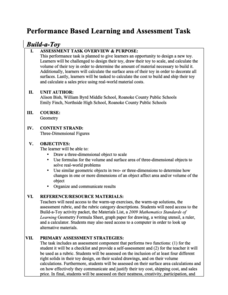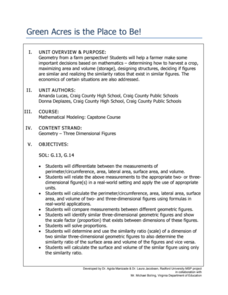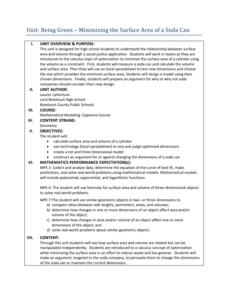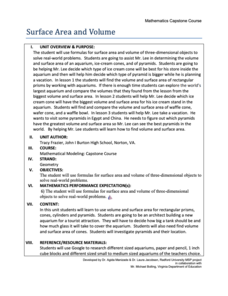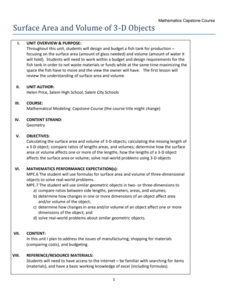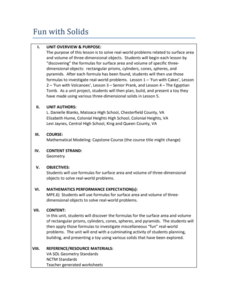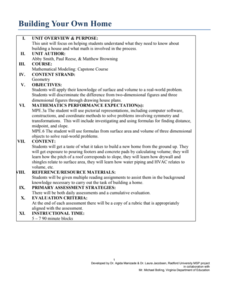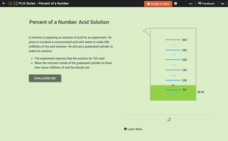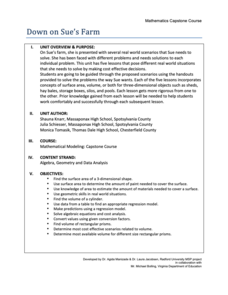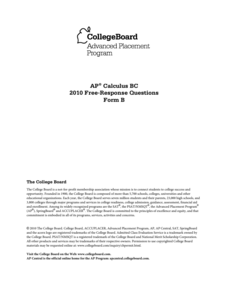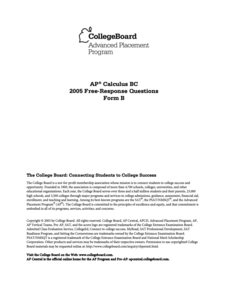Radford University
Building Sandcastles
Finalize the plans before playing in the sand. Learners design sandcastles using geometric and composite figures. They create blueprints, including the scale, and three-dimensional models of their castles. Finally, scholars calculate the...
CK-12 Foundation
CK-12 Middle School Math Concepts - Grade 6
Twelve chapters cover a multitude of math concepts found in the Common Core standards for sixth grade. Each title provides a brief explanation of what you will find inside the chapter—concepts from which you can click on and learn more...
Radford University
Build-a-Toy
Don't toy with using a fun lesson. Scholars design new toys and then create scale drawings. They determine the volume and surface area of the toys, and then research prices of raw materials to estimate the manufacturing costs.
Radford University
Koi Pond
There's nothing fishy about the activity. Future mathematicians design a koi pond from various three-dimensional shapes. They calculate the perimeter, area, and volume of the pond, and then create PowerPoint presentations. They also...
Radford University
Green Acres is the Place to Be!
Nurture a love of math and farming at the same time. Pupils apply geometry concepts, such as surface area and volume of three-dimensional shapes and similarity ratios, to farming contexts. They consider the dimensions of bales of hay,...
Radford University
Being Green – Minimizing the Surface Area of a Soda Can
Save the world by designing a new soda can! Learners first measure the dimensions of a typical soda can and calculate its surface area and volume. They then use spreadsheet software to minimize the surface area for the volume, thus...
Radford University
Surface Area and Volume
Who knew there were pyramids in China? Learners apply surface area and volume formulas to several different real-world situations. They calculate the volume and surface area of an aquarium, an ice cream cone, and Egyptian and Chinese...
Radford University
Fun with Solids
Unlike a volcano, the lesson won't blow up in your face. Young mathematicians use dried beans to discover the relationship between the volumes of cones and cylinders and to write a formula for the volume of a cone. They then research...
Radford University
Surface Area and Volume of 3-D Objects
Don't let the class tank the project. After reviewing formulas for surface area and volume, pupils design fish tanks that maximize volume. They research cost of materials online and must meet a budgetary constraint when creating their...
Radford University
Fun with Solids
Cakes offer a yummy way to learn about math. Scholars use manipulatives to discover the formulas for the surface area and volume of prisms and cylinders. They use their formulas to calculate the amount of cake mix and frosting necessary...
Radford University
Fun with Solids
Geometry is all around us—if we're only willing to look. The final three activities of the Fun with Solids unit continue work on surface area and volume. For lesson three, scholars investigate the formulas for spheres and solve a problem...
Radford University
Building Your Own Home
Building a home means mastering math. Scholars apply various math topics to situations associated with the construction of a home. They consider the volume of concrete needed for a foundation, the perimeter and area of
blueprints, the...
CK-12 Foundation
Percent of a Number: Acid Solution
Mathematicians answer five questions about percents, ratios, and proportions with help from an interactive graduated cylinder. Question types include multiple-choice, fill-in-the-blank, and discussion.
Radford University
Down on Sue's Farm
When would a farmer use math? Class members work through five tasks on a farm that require knowledge of surface area, volume, and determining regression equations. The challenges range from figuring out the amount of paint to buy,...
Radford University
Ping Pong Packing
Bounce off some ideas to reduce the amount of wasted space. Teams work together to determine the best size and shape of container to package a large order of ping pong balls. Groups are to design the container to reduce the amount of...
Radford University
2 and 3 Dimensional Shapes
Take a similar approach to three dimensions. Pupils develop the relationship between areas of similar objects and see how they relate to the ratio of the sides. Building upon area formulas, small groups put together volume formulas for...
Radford University
Next Top Model
Create a world of similar models. The geometry and measurement unit uses real-world scenarios to create models of familiar buildings and rooms. Scholars work with blueprints and scale models to compare areas and volumes between the...
CK-12 Foundation
Area and Volume of Similar Solids: Similar Solids
Five questions make up an interactive designed to boosts knowledge of area and volume of solid figures. Question types include multiple-choice, true or false, and fill-in-the-blank. A scale model changes measurement to provide a visual...
College Board
2010 AP® Calculus BC Free-Response Questions Form B
Keep moving along a curve. Two items in the set of released free-response questions from the 2010 AP® Calculus BC exam involve movement along a graph. One involves particle motion along a polar curve while the other uses a squirrel...
College Board
2005 AP® Calculus BC Free-Response Questions Form B
Let's put it in context. Pupils use the AP® Calculus BC free-response questions to practice for the exam. Five of the six released items deal with mathematical problems, with one using a real-world situation. Learners use differentiation...
College Board
2004 AP® Calculus BC Free-Response Questions Form B
Take another look at the exam. A set of questions is a different form for the 2004 AP® Calculus BC free-response question section. The questions are evenly split into calculator and non-calculator sections. Pupils use their knowledge of...
College Board
2003 AP® Calculus BC Free-Response Questions Form B
Be integral to the learners in the classroom. Pupils use integrals, differentiation, and limits to solve the free-response questions from an AP® Calculus BC exam. Items cover topics such as area under a curve, particle motion, average...
College Board
2002 AP® Calculus BC Free-Response Questions Form B
Though the items may be older, they still provide information. Released free-response items from the 2002 AP® Calculus BC exam provide teachers and pupils with information about how topics appear on the exam. Questions come from the AB...
College Board
2011 AP® Calculus BC Free-Response Questions
Does the exam look pupils expected? Released free-response questions from the AP® Calculus BC exam allow teachers and pupils to see and practice with actual exam questions. Three of the questions come from the AB portion of the course...




